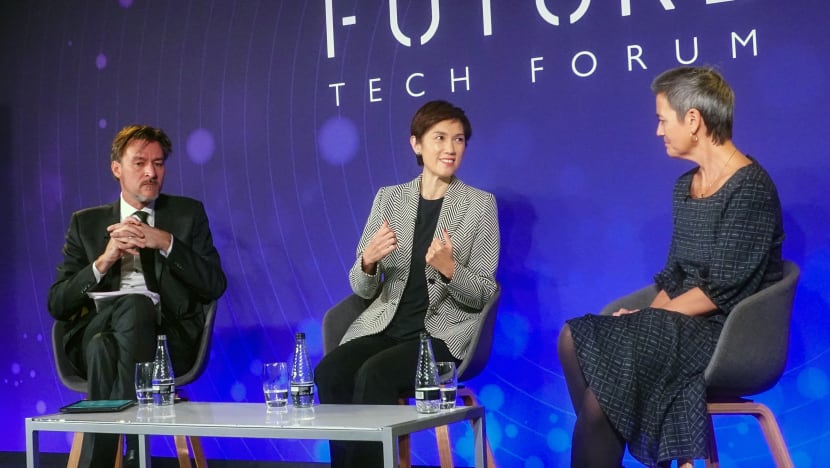Digital regulations needed to build trust so people, businesses have confidence participating in digital domain: Josephine Teo

Minister for Communications and Information Josephine Teo at the Future Tech Forum panel discussion in London with Executive Vice-President of the European Commission for a Europe Fit for the Digital Age Margrethe Vestager and Deputy Secretary-General of the Organisation for Economic Cooperation and Development (OECD) Ulrik Vestergaard Knudsen. (Photo: MCI)
SINGAPORE: There is a "growing international consensus" that digital regulations are needed to build trust, so people and businesses continue to have "a sense of confidence" participating in the digital domain, said Minister for Communications and Information Josephine Teo on Wednesday (Dec 1).
Mrs Teo was speaking to reporters during a work trip to London, where the Singapore Government signed three Memorandums of Understanding (MOUs) with the UK. These MOUs are in the areas of digital trade facilitation, digital identities and cybersecurity.
"The MOUs between Singapore and the UK will further support opportunities to grow the digital delivery of cross-border services between Singapore and the UK, provide a basis for working closely with like-minded digital partners, and help set a global benchmark on high standards for digital cooperation to bring economic and societal benefits to both countries," said the Ministry of Communications and Information (MCI).
Mrs Teo also participated in the Future Tech Forum, where she met with key government and industry leaders to discuss Singapore's approach to digital regulations.
DIGITAL REGULATION
In every aspect of daily lives, there are some regulations to make sure that there is safety, Mrs Teo told reporters.
"And so the same in the digital domain. People, citizens of every country will expect that someone is regulating the delivery of digital services to make sure that they don't do individuals as well as society harm," she said.
"Of course online harm is just one aspect of it. But the new regulations are intended, at least at the start of the design process, to recognise the need to protect the users from online threats."
Mrs Teo said that there has been "an erosion of trust" in how digital technologies can be applied. Digital regulations are "very much needed in order to build trust", she said.
In response to questions about whether the Government plans to clamp down on big tech companies, such as Facebook, Mrs Teo said Singapore adopts a "collaborative approach".
"We'd like to bring them into the conversation. We'd like to involve them in designing the solutions for them. And so that's going to be still the approach that we take. It does not mean, however, that when regulations are needed, we won't go ahead with them," she said.
"But even in designing the interventions, whether it's laws or updating our codes of practices, we would want to engage with all the companies, the representatives, including the tech giants, to understand how it will impact them or not impact them."
"ALWAYS A FINE BALANCE"
At the forum, Mrs Teo also noted interest from other countries in how digital technologies have helped Singapore combat the spread of COVID-19, but at the same time, "how appropriate regulations were needed to give people the confidence that the technology is trusted and that it isn't used against them".
For example, participants were interested in "how POFMA (Protection from Online Falsehoods and Manipulation Act) had been invoked several times" to address misinformation related to COVID-19, such as falsehoods about vaccines, she said.
Participants from other countries were also interested in the TraceTogether app, she added.
"The fact that I shared that people were able to trust it enough to use it every day to perform check-ins. It intrigued other participants that the number of check-ins that are tracked on TraceTogether and SafeEntry exceeds 10 million every day. That's something that's quite interesting to them," she said.
"They were very curious about Singaporeans' acceptance of a tracking device, like what technology did we use in order to give people the assurance that it's not a Big Brother watching them."
When asked by reporters whether a law like POFMA is at odds with the Government's "light touch" to regulations, Mrs Teo said there must always be balance.
She said that "in essence, a law like POFMA says our society value truthfulness".
"In public discourse, we can disagree with others, we can have different opinions, but they have to be grounded in facts. If public discourse is based on falsehoods, then I think we have a problem," she said.
"Does it mean that as a result of upholding this value, each one of us has to be constrained in some way? The answer is yes. But does it prevent you from expressing your views (and) participating actively? I think even after POFMA has been enacted and put into effect, the kind of participation in the online space has not reduced. It has only gone up."
When we think about regulations, "it is always a fine balance", she added. "It is about doing things not too early, not too late."
"We don't rely only on rules and regulations and laws, even though we will certainly not avoid them ... When it comes to regulating the digital domain because it is changing so fast, we cannot approach it believing that we will get every piece of intervention right the first time.
"But at the same time, we must have the courage to stay the course if we think that what we're doing is actually producing the results."
The need for balance means there is "a lot of judgment involved", said Mrs Teo.
"And this judgment has to be grounded on our understanding of the technology ... and an objective assessment of the impact on individuals and on society."














